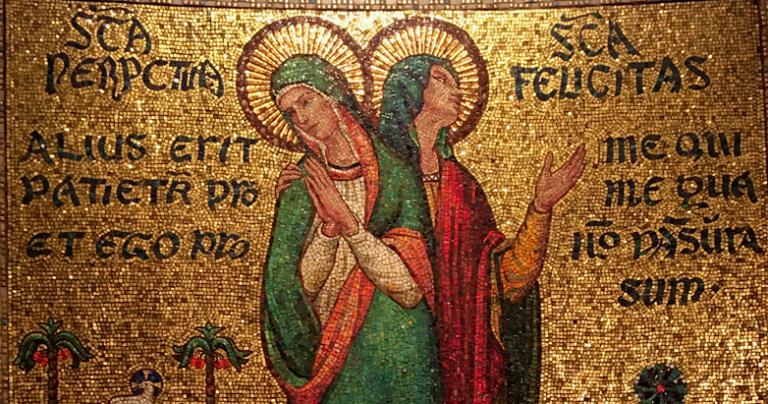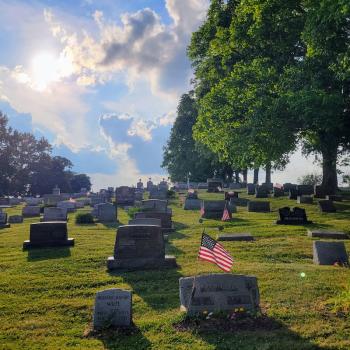This is what was spoken through the prophet Joel:
“In the last days it will be, God declares,
that I will pour out my Spirit upon all flesh,
and your sons and your daughters shall prophesy,
and your young men shall see visions,
and your old men shall dream dreams.
Even upon my slaves, both men and women,
in those days I will pour out my Spirit;
and they shall prophesy.”— Acts 2:16-18

The anonymous curator of the final writings of the early Christian martyrs Perpetua and Saturus begins his(?) prologue citing these words of the Acts of the Apostles and the Prophet Joel. The narrator calls their testimony of words and blood “new witnesses”* to glorify God and strengthen men the same as “ancient examples of faith.” (This contrast of “new” with “ancient” may strike the reader as ironic, given that the date of their death is given as March 7, 203, but it testifies to the firmly-established Christian community and tradition even a century before the Edict of Milan.) Anyone familiar with the traditional litany of saints in the First Eucharistic Prayer has heard the names of Felicity and Perpetua, but how many are familiar with the radical witness of these two women, the only non-virgin women to be honored in Eucharistic prayer?
Vibia Perpetua, the narrator explains, was “nobly born, reared in a liberal manner, wedded honorably, having a father and mother and two brothers, one of them a catechumen likewise, and a son, a child at the breast, and she herself was about 22 years of age.” She was baptized despite the protests of her father, while he was out of town. A few days later she and a handful of other new Christians were arrested and imprisoned, including the servants Revocatus and Felicity. Felicity was several months pregnant at the time of her imprisonment.
What is most remarkable about the Passion of Perpetua is that most of it is told in her own voice, written by her own hand, completed the day before she faced the beasts in the arena in Carthage. This makes her one of the few women in history to explain for herself the circumstances of her own martyrdom, and certainly the most ancient. The details of the lives and martyrdom of the other early Christian women are generally lost to history, shrouded in hagiographic stylization, but Perpetua recounts in vivid detail her conversations with family members and fellow prisoners, her pains in prison as a nursing mother, and the visions she receives.
Quite distinct from the hagiographies of the virgin martyrs, Felicity and Perpetua did not see their status as wives or mothers as being a hindrance to their total commitment to Christ. Perpetua recounts multiple arguments with her father over his pleas to conceal her Christianity and offer pagan sacrifice for the Emperor for the sake of her life, her son, and her family’s honor, but she never mentions her husband at all. (Granted, under the culture of the Roman Empire at the time, a married woman’s father continued to have greater authority over her than her husband, but it is still curious that only the narrator mentions the existence of a husband, presumably alive or else she would have been named a widow.) Perpetua worries about her son’s survival as a nursling when he is separated from her, and calls the prison a “palace” when she is able to keep him there with her. She entrusts his welfare to God, who answers with the boy’s instant weaning at the point when she will no longer be able to nurse him.
Felicity similarly submitted her motherhood to God’s Providence. The narrator recounts her lament that she might be separated from her Christian companions and martyred later, because she was eight months pregnant and the law prohibited the torture and execution of pregnant women (apparently even pregnant slaves). The prayers of the group were answered by her early labor, so she gave birth to a daughter in prison, who was raised by a sister. Felicity faced the beasts just three days later.
The fact that these women willingly died for the faith, leaving behind such young children, apparently gave no scandal nor diminished their virtue to the Christian community recounting their story. Indeed, despite the introduction identifying Perpetua as honorably wed, the narrator goes on to recount her entrance into the amphitheater “glorious of presence, as a true spouse of Christ and darling of God, at whose piercing look all cast down their eyes. Felicity likewise, rejoicing that she had borne a child in safety, that she might fight with the beasts, came now from blood to blood, from the midwife to the gladiator, to wash after her travail in a second baptism.”
In addition to the bold witness of their actions, Perpetua’s account of the visions she received in prison provide great insight into the after-life. In her first vision of ascending into heaven, she trod on the head of a great serpent as the first step onto the ladder into heaven. At the top she saw:
a very great space of garden, and in the midst a man sitting, white-headed, in shepherd’s clothing, tall, milking his sheep; and standing around in white were many thousands. And he raised his head and beheld me and said to me: Welcome, child. And he cried to me, and from the curd he had from the milk he gave me as it were a morsel; and I took it with joined hands and ate it up; and all that stood around said, Amen. And at the sound of that word I awoke, yet eating I know not what of sweet.
I do not presume to be an interpreter of dreams, but these images speak to my understanding of Heaven as the infinite sharing of love among the sanctified souls, infinite gifting of self and receiving with gladness the sweetness of each distinct person. God milking His sheep to present the sweet morsel, to me, signifies that the gift of Heaven does not come exclusively from the presence of God, but also from our capacity, through His grace, to give gifts to each other.
The curator of the Passion of Perpetua also included an account from her companion Saturus, who was also blessed with a vision of Heaven. Saturus also saw a magnificent garden with a white-headed man, adding that he was “youthful of countenance.” Four angels raised the martyrs to this man on the throne, “and we kissed him, and with his hand he passed over our faces.” After this affectionate greeting, the elders told them, “Go you and play” (a theme that will be repeated in Perpetua’s next vision). Perpetua tells Saturus in the vision, “God be thanked, so that I that was glad in the flesh am now more glad”—these martyrs were no gnostics despising the lives and the bodies they were sacrificing. They also encounter their former bishop and priest, who bow before the martyrs, shocking them. Perpetua began talking with them in Greek (though she wrote in Latin) in Saturus’s vision. The angels tell the clergymen to put away any dissensions among them, and to correct their people for “wrangling” like those who are returning from the games.
Perpetua’s second vision provides vivid support for Catholic teachings about Purgatory and the redemption of souls through the Treasury of the Church in the Communion of Saints, and in particular the opportunity for redemption of un-baptized persons in the after-life. In the midst of waking prayer, Perpetua’s brother Dinocrates, who had died many years earlier from disease at the age of seven, suddenly came to mind. “And straightaway I knew that I was worthy, and that I ought to ask for him. And I began to pray for him long, and to groan unto the Lord.” That night she dreamed of him in a dark place, in his diseased state, “and between him and me was a great gulf, so that either might not go to the other” (echoing the parable of Lazarus and the rich man). There was a font full of water, but he could not reach to drink from it. After this vision she continued to pray for him, and some days later “on the day when we abode in the stocks,” she had another vision of Dinocrates, “clean of body, finely clothed, in comfort,” and “he drew water [from the font she had seen before] which flowed without ceasing… And being satisfied he departed away from the water and began to play as children will, joyfully. And I awoke. Then I understood that he was translated from his pains.”
Perpetua’s third and final vision is the most unusual and intriguing to me. I will recount it but dare not try to comment upon it:
And I saw much people watching closely. And because I knew that I was condemned to the beasts I marvelled that beasts were not sent out against me. And there came out against me a certain ill-favored Egyptian with his helpers, to fight with me. Also there came to me comely young men, my helpers and aiders. And I was stripped naked, and I became a man. And my helpers began to rub me with oil as their custom is for a contest; and over against me saw that Egyptian wallowing in the dust. And there came forth a man of very great stature, so that he overpassed the very top of the amphitheatre, wearing a robe ungirdled, and beneath it between the two stripes over the breast a robe of purple; having also shoes curiously wrought in gold and silver; bearing a rod like a master of gladiators, and a green branch whereon were golden apples. And he besought silence and said: The Egyptian, if shall conquer this woman, shall slay her with the sword; and if she shall conquer him, she shall receive this branch. And he went away. And we came nigh to each other, and began to buffet one another. He tried to trip up my feet, but I with my heels smote upon his face. And I rose up into the air and began so to smite him as though I trod not the earth. But when I saw that there was yet delay, I joined my hands, setting finger against finger of them. And I caught his head, and he fell upon his face; and I trod upon his head. And the people began to shout, and my helpers began to sing. And I went up to the master of gladiators and received the branch. And he kissed me and said to me: Daughter, peace be with you. And I began to go with glory to the gate called the Gate of Life.
And I awoke; and I understood that I should fight, not with beasts but against the devil; but I knew that mine was the victory.
Across the millennia, Saints Felicity and Perpetua and their companions remind us that those “who were baptized into Christ have clothed yourselves with Christ. There is no longer Jew or Greek, there is no longer slave or free, there is no longer male and female; for all of you are one in Christ Jesus.” (Gal. 3:27-28) Together they stood, male and female, slave and noble, unafraid to face down the Devil in the form of the bloodthirsty Imperial powers, unashamed to be naked at times during their trial, save for the clothing of their dignity in Christ. They were elevated by the witness of their lives and the power of the Holy Spirit even above the clergy who had taught them the faith. Societal proprieties attached to their stations in life meant nothing to them, but only attaining the crown of glory, and nourishing others by their prayers and their milk and their blood.
Saints Felicity and Perpetua, pray for us.
* All quotes taken from the “modernized” translation of The Passion of Perpetua and Felicity by W.H. Shewring (London: 1931), available at https://sourcebooks.fordham.edu/source/perpetua.asp.
















